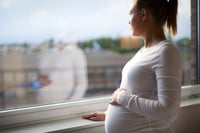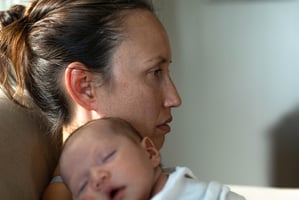Edinburgh Postnatal Depression Scale May Detect More Than Depression in Early Pregnancy

Screening women in early pregnancy with the Edinburgh Postnatal Depression Scale (EPDS) may help to detect women experiencing more than depression symptoms alone, suggests a study Acta Obstetricia et Gynecologica Scandinavica.
Caroline Lilliecreutz, M.D., Ph.D., of the University Hospital Linköping in Sweden and colleagues analyzed data collected from more than 2,200 Swedish-speaking women receiving prenatal care in Linköping during their first trimester of pregnancy. The women, aged 18 and older, were screened using the EPDS (a 10‐item self‐report scale designed to screen for postnatal depression) before their 14th week of pregnancy. A woman was considered to have screened positive for depression if she had an EPDS score of ≥13 or any indication of thoughts of harming herself (scoring one to three points on item 10 on the EPDS while having a total score <13). The women who screened positive on the EPDS were then evaluated using a structured diagnostic interview known as the Primary Care Evaluation of Mental Disorders. They were also asked questions about substance misuse, partner abuse, financial problems, serious life events (such as a death of a close relative or life-threatening trauma), sleep disturbances, and more. The researchers then compared the medical records of women who screened positive on the EPDS with a group of 150 women who had EPDS scores of 12 or lower.
Of the 149 pregnant women who scored 13 or higher on the EPDS, 126 (85%) were diagnosed during the face‐to‐face interview with a current mental disorder or risk factor for mental disorders, Lilliecreutz and colleagues reported. Among these women, 36% were diagnosed with depression, nearly 15% were diagnosed with an anxiety disorder, 48% had a history of depression, and nearly 21% reported a severe fear of childbirth. Among the women who screened negative, only three (2%) presented with symptoms of depression during pregnancy. Compared with women who screened negative on the EPDS, those who screened positive were more often smokers (16% vs 1%), unemployed (20% vs 1%), or on sick leave (25% vs 14%) during pregnancy.
“The EPDS is constructed for the detection of depressive symptoms, but in this study, we have also shown that the presumption that EPDS scores >12 only indicate probable depression is an oversimplification,” Lilliecreutz and colleagues wrote. “This study shows that the EPDS might be a helpful tool for ... identifying women in early pregnancy who are suffering from different types of mental disorders or risk factors for mental disorders.”
For related information, see the Psychiatric News article “Suicide, Overdose Are Significant Contributors to Pregnancy-Related Maternal Deaths.”
(Image: iStock/kjekol)
Don’t Miss Your Chance to Vote in APA’s 2021 Election
APA’s 2021 election is now under way. Review the individuals running for office, watch candidate videos, and learn more about the election process at psychiatry.org/elections. The deadline to vote is Monday, February 1, at 11:59 p.m. ET. If you are a voting member of APA, just go to APA’s website at psychiatry.org/election and click on “Vote Today.”
Don't miss out! To learn about newly posted articles in Psychiatric News, please sign up here.






